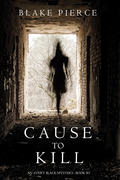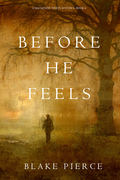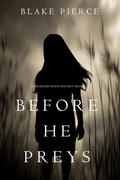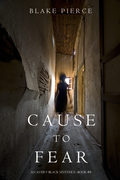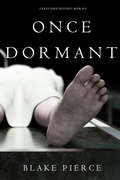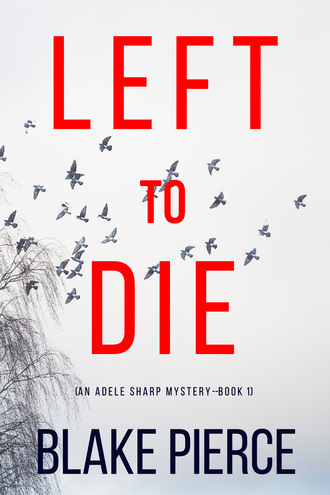
Блейк Пирс
Left To Die
CHAPTER TEN
Raindrops rattled the windows in staccato, ushering frigid gloom into the temporary office they’d given Adele back at the DGSI headquarters. She leaned in her chair, staring at the ceiling, studying the fresh paint that glazed the concrete. A small black radiator, of the electronic variety, whirred softly behind her. The office was still unfinished and the heating units were a temporary measure. In the back of the room, a few outlets extended naked wires like the tentacles of some tiny ocean creatures. Back at headquarters in San Francisco, Adele hadn’t been given her own office. There were too many agents for that to be considered fair. But again, an agency like the DGSI, which was only a decade old, pulled out all the stops to tempt new recruits. And, like Robert had said, the recent wave of terrorist attacks in Europe, despite all the political implications, had increased the budget for most intelligence agencies.
“How do you fair, my sweet?”
Adele turned slowly, glancing toward the door, her gaze tracing from the figure’s polished shoes, up his well-maintained, pressed pants, and lingered on his manicured fingernails. Then she smiled softly and met her old mentor’s gaze.
“Not well, I’m afraid,” said Adele. She leaned back in her chair, pressing her head against the cold wall, still listening to the rain in the background. “Can’t say that we’ve done much.”
Robert ran his hands through his ever-thickening hair, and the early wrinkles around his eyes creased as he squinted in her direction, adopting a look of concern. “You put an APB out?”
She nodded. “John did. Red-haired tourists. Can’t imagine there’s too many of those; at least not in the city.”
Robert stood straight in the doorway, his posture perfect. Most folks would’ve leaned against the doorframe, or come into the room and relaxed in one of the chairs across the desk from Adele. But Robert stayed where he was, upright, dignified, a bit pompous. He peered down at her, and the short man cleared his throat with a rasping sound. “How is it being back home?”
Adele crossed her legs, pressing her heels on top of the desk. She sighed, ushering a breath in his direction, exhaling the stress and frustration clogging her lungs.
“I’m not sure I am,” she said, softly. “Not sure I have a home. But there are worse things, I suppose.”
At this, Robert frowned, and he stepped into the room, studying her slowly.
Adele met his questioning look. “I’m not the one who chose to move around as much as we did. A child doesn’t always have the options they’d like.”
He continued to study her in silence, thinking through his words carefully before speaking. “No,” he said at last, a curt, clear word. “But perhaps it isn’t you don’t have a home. But that you have more than one.” He dusted at his dustless suit. “Perhaps it isn’t a curse, but rather a blessing. There are those who would be lucky to have more than one home.” Robert stepped further into the room and made his way slowly over to the window, peering out into the gray skies. “For me, Paris is my home. I would envy the ability to hold fondness for more than one place.”
Adele smiled at the man, but she didn’t say anything. She knew what he was trying to do. And she appreciated the effort. But words didn’t change the truth of the matter. She had never quite belonged anywhere.
That wasn’t a claim for pity. Rather, it was a position of strength, especially as an investigator, to be an outsider looking in. The outsider always brought a new perspective that locals might not possess. Her life, her upbringing—Germany to France to the US—gave her insight that others didn’t hold. Each place she lived had its own boon, a gift of experience that it bequeathed her. And yet, whenever she contemplated such things, a slow ache often developed in her chest, not quite unlike anxiety. Perhaps it was closer to loneliness.
She thought vaguely of her mother. But then shook her head, dislodging the thought.
“Have we had any hits yet?” she said, quickly, clearing her throat and speaking more firmly. Robert was still staring out the window. He gave the slightest shrug of his suited shoulders. “I have not heard anything.”
“What case are you working on?”
“Nothing new. They have me in an advisory role only.”
The way he said it gave Adele pause. There was an edge to his voice that she didn’t quite understand.
She stared at the back of her mentor’s head, watching him, studying his silhouette framed against the window. “Oh?”
He shrugged again and turned toward her; the droplets stippling the window framed him in a sort of liquid halo.
It’s good to have you back,” said Robert. “I’ll leave you to your work. But you know where I am. My number is the same. If ever you need anything—”
“I know. I really do. And I’m grateful. Extremely grateful.”
He flashed one of his rare smiles, which revealed two missing teeth in the front left side of his mouth. For a man who cared so much about appearances, the missing teeth were often jarring to people. Adele had never quite learned the story behind them, but she knew better than to ask.
As she watched him go, she wondered vaguely what he’d meant by “advisory role.” She knew the agency liked to hire young talent. But the thought that anyone would try to edge Robert, of all people, out of his job was ludicrous.
As he stood in the doorway and hesitated, he turned back, scratched his chin, and, in a thoughtful voice, said, “Forgive me if I’m wrong, but you said this murderer, this killer, didn’t choose his victims based on any particular traits. Nothing except for their age.”
Adele nodded, listening intently.
Robert wasn’t looking at her anymore, and instead seemed to be studying the carpet on the floor with a frown creasing his face. “If someone doesn’t kill because of qualities the victims possess, would it be fair to assume he kills because of qualities of his own?”
“I’ve thought similarly,” said Adele.
“This red-haired man; he’s young enough to still have red hair.”
Adele glanced up at her partner, refusing to glance toward his own dark hair. She chuckled softly. “I do think there are methods nowadays that prevent the bane of gray. Plus, it could be a wig.”
Robert stiffened and shook his head slightly, running his hand through his own hair again, but then he relaxed once more and said, “But not red. A killer who is aging wouldn’t dye their hair red, would they? It’s too conspicuous. And if a wig, why choose red?”
Adele looked at him for a moment, then nodded slowly. “It does draw the eye… So you think his hair is naturally red? Red enough for him to be young; that’s what you’re saying?”
Robert gave another short jerk of his head. “Young enough to retain the color of his hair, self-obsessed enough to kill people based on qualities he possesses.”
“He fled to France,” Adele continued, speaking softly. Memories, past brainstorming sessions, much like this flitted through her mind. She and Robert often discussed cases, following one’s lead with thoughts of their own, building momentum with back and forth.
A slow prickling chill of exhilaration made itself known as goosebumps across the back of her arms.
She said, “The ages have always been interesting to me. Why would someone flee if they were so obsessed with time? He had a routine; he killed on schedule. Every two weeks. For someone so obsessed with time—and, if like you say, still young, then one might think he’s obsessed with their ages for a reason.”
“Fled,” said her old mentor. “You seem certain of that word.”
Adele paused, considering it, her mind racing. Robert often had a way of bringing out the best in her. He would phrase things in such a way that made sense, and would help spark her own deductive process. He watched her, a strange look on his face, not unlike the proud smile of a father toward his child. At last, though, Adele nodded, her teeth set. “I was closer than I thought. I almost caught him. That has to be it. I didn’t think I was making any headway back in the States. But he’s obsessed with time. A young man, at least young enough to have his normal hair color, who is obsessed with the passage of time. He would have loathed the idea of wasting time. It would have eaten at his core to have wasted the time it took to flee the US and come to France. He killed as soon as he could, and that means he had to have left the US because he needed to flee. Because he thought that was the only option.”
Robert was nodding now, his lips pursed, his serious face even more solemn with plucked eyebrows curved over his dark eyes.
“That’s the only explanation,” said Adele. “Barring some personal issue, which I doubt would make someone like this flee, the only thing that explains the interruption of this pattern, this trip to France, is that I was getting closer than I thought. Something I did, something I said, someone I talked to, had him spooked.”
“He was scared. Perhaps you need to give yourself more credit.”
Adele shrugged, tilting her head until she was staring up at the ceiling once more. “Thank you,” she said, softly, but her voice trailed off as her thoughts took over, carrying her into a series of considerations that flitted through her mind.
She tried to think back: when would she have spooked this killer? She thought of the interviews she had, the people she spoke to. She thought of the houses they had warrants for, searching. Dead ends, all of them. No one red-haired. No one mentioning anything about a red-haired killer.
Yet, somehow, the knowledge alone that she was getting close was enough to revitalize her, if only a little. She glanced back toward the door and Robert was gone.
He often did this, leaving without so much as a farewell. Robert was the sort who hated goodbyes. Adele, over the years, had grown numb to them. But perhaps she wouldn’t have to this time.
She glanced around the room and looked out toward the skies beyond. The rain was slowing somewhat, and the sound of tapping against the windows was starting to fade. The DGSI was quite like she remembered. There was more freedom in operations than back with the FBI; there was often harder sentiment toward agency overreach from the locals. But also, the agency had resources; they were a smaller nation, with less to keep track of, and so they had resources and time like she wasn’t always accustomed to.
She shook her head slowly, scratching absentmindedly at the back of her knuckles. Maybe it wouldn’t be so bad to come back here. France wasn’t far from being her home. She had spent most of her teen years and her time at university in this country.
Still, something else was niggling at her thoughts.
She lowered her feet off the desk and got up, frowning. She wanted to check the status of the APB, to see if any reports of been filed. Red-haired tourists couldn’t be that common. Especially those who had arrived sometime within the last month. But, if it was true she was getting close, and if it was true that this was a man obsessed with the passage of time, obsessed with age, and his victims, then he was also the sort of man who would try to make up for lost time. In the past, he had killed once every two weeks.
Now, though, Adele shook her head, clenching her teeth. Now—she could feel it—he wouldn’t wait so long this time. He would kill and kill soon.
CHAPTER ELEVEN
Adele strolled along the boulevard that led to Marion’s tall apartment building. He had stalked her here. She had died within screaming distance. Adele glanced up at the safety lights—now off during the day—lining the sidewalk.
She sighed softly, her shoes patting with wet little slaps against the sodden concrete. The streets were still mostly empty as it was a workday, mid-afternoon. The rain also served to rapidly usher pedestrians and drivers quickly on their way. Adele preferred the solitude. She needed to think, to clear her mind. There had to be some clue she was missing. Something she’d read, or spotted, something that would just make sense if she could focus. Adele smiled as a couple of sparrows chattered at each other in the safety of a small decorative tree. The trees were stationed every ten feet or so and had been part of an effort by the French government to bring green back to Paris.
Adele stepped under the trees and winced as cold droplets of water fell from the leaves and tapped against her neck.
She paused at the corner of the street, glancing to her right. Marion’s apartment rested within sight now—tall, brown, boasting curving black railings every twenty feet beneath windows—and she could trace the path the girl must have taken the very last time she’d come this way.
Adele turned, heading back toward Marion’s apartment, preparing to trace the girl’s steps once more. But then she hesitated. She recognized the street.
She turned to the left now, scanning the mailboxes, the benches, and the bus stops lining the gray curb.
She chewed on the corner of her lip, a look of discomfort spreading over her features.
“No,” she said, quietly. “Not today.”
She turned to the right again and began marching purposefully toward Marion’s apartment. But again, before she stepped off the sidewalk into the crossing, she pulled up once more.
Her hands balled at her sides. John was still keeping track of reports of redheaded tourists. So far, the APB had turned up nothing, but Adele held hope. The clue was specific. Specific enough to matter.
She sighed again, huffing slightly. And then she turned sharply; she began striding rapidly up the sidewalk, away from Marion’s apartment, away from the crime scene, away from the path the poor young girl had taken before she’d been drugged and bled to death. Away from it all.
As she walked, for a moment, she fell in lockstep with the killer.
She felt like she too was descending in age. Memories from a past life—twenty-eight, twenty-seven, twenty-six… Eighteen, seventeen, sixteen… memories from her youth flooded her mind. She could remember walking these streets before. She turned up one sidewalk, then down another street, cutting between large, looming buildings on either side, the bricks stained red, the windows glinting dully, protected by curtains on the inside.
Adele continued to walk. She missed the city.
She missed the bells tolling in the distance, the smell of the river on the air, the sound of the nightlife, even in the tourist districts. Marion’s friends had said she was far too kind to tourists. Far more compassionate than anyone else would normally be.
A girl like that didn’t deserve to end up like this.
Adele allowed her own thoughts to propel her further and deeper into the city, walking like a mechanical construct, without tiring, without lagging, and without hesitating.
At long last, she pulled up short.
Adele faced a small store, little more than a curio shop. She stepped inside, and the bell jangled overhead. It didn’t take her long to spot the candies she knew would be offered in a place like this. She pointed them out and fished a couple of dollars from her pocket. Then she cursed beneath her breath. Not everyone accepted US currency in France; she waved the dollars toward the man behind the counter. He had olive skin and a soft smile. He nodded once, noting her chagrined look, and graciously bowed his head in her direction.
He wore prayer beads around one wrist, and a red vest with gold lace along the trim. He had kind eyes that studied her, before he reached over and took the dollar bills from her hand.
Marion hesitated, wondering if she should wait for change, but then thought better of it. She nodded her thanks, took the candies, and headed out the door.
She could feel the crinkling of the wrapper in her hand, around the toffee of the Carambars.
Cara. That’s what her mother had often called her. Cara—sweet on the inside, witty on the outside. A description that had made her blush as a child.
She didn’t blush anymore, though.
Adele took two more streets and then came to a stop in the park. Slow, creeping dread tickled her spine, crawling up toward the nape of her neck with pinpricks of motion.
She shivered, trembling, the air cool but not cold. A few couples were making their rounds along the red cobblestone paths, their arms looped together, their umbrellas protruding skyward. Adele waited for one such couple to pass, rounding behind a series of uniform trees and neatly kept brush.
Then she too stepped into the park, moving past the fountains, along the circular trails around twin ponds, one larger than the other. Some called it the figure eight. To Adele, that path had always looked more like a noose.
She went deeper into the park, toward the back. She knew youngsters would often make out on the picnic tables in the distance, beneath the low-hanging yellow and orange leaves of the park trees. She headed along the bicycle path, the candy bars crinkling in her right hand, her left hand balled into a fist. Then, at long last, she pulled up short.
No one was in sight. She could hear birds still chirping around her, calling to each other, indicating the rain had passed.
And yet, an even deeper, more wretched gloom had settled on her shoulders like a weight.
She stood at the trail head, staring at dirt and mud and patches of dust that had been protected by overhanging branches from the rain.
Trees on either side of this trail sheltered it from view and from the elements. It had also sheltered the scene that had occurred nearly ten years ago.
Adele stared at the patch of dirt and the rivet by the trail. She could see the way the brush had overgrown, covering what had once been clean-cut grass. Had this been intentional?
To her, it felt disrespectful.
Adele fidgeted, tugging at her sleeve, then glancing toward the sky as if looking for insight.
“This was never my home,” she said quietly. She listened to the wind and found silence, as she knew she would. “I’m sorry,” she said, her voice cracking suddenly.
Her legs felt very weak all at once, and her throat felt scratchy. She reached up and adjusted the sleeves of her jacket, scraping one foot against the dusty trail.
“I don’t know what happened,” she said toward the weeds and brambles. “I should’ve found out—I should’ve. If I was better at my job. If I could have just focused…”
Adele shook her head and turned as if to leave, but something held her firm. She glanced back toward the now overgrown patch of grass on the side of the trail.
She remembered when she had first seen her mother’s corpse. Blood, lacing the cuts up and down her body. The killer had let her bleed out, much like the Benjamin Killer was doing with his victims.
Adele felt a slow shudder at the memories. Loathing, like she had only known once before, filled her. A familiar loathing coupled with a familiar reason.
“I’m sorry,” she repeated.
What else was there to say? She had failed her mother. She had never caught the killer responsible. And now the Benjamin Killer was also bleeding people. Like her mother. And again, like with that case, she was failing. He would get away. They always got away. Adele snarled, emitting a sound like a wounded creature, and then winced. She didn’t like it when her mind went to places like these.
He couldn’t get away. Not this time. Men like this, people who did things like this, couldn’t be allowed to exist. It wasn’t right.
“It’s not fair,” she said, her teeth clenching at the end of the word, biting the sound off in a short spasming surge of emotion. “I’m not your Cara anymore,” she said softly.
The breeze seemed to pick up, wrestling at her hair, glossing her skin with the cool touch of the swaying breeze.
Her hand felt sweaty all of a sudden, and she glanced down toward the candies. She hadn’t even realized why she bought them.
She unwrapped one of the candies and popped it in her mouth, wincing at the flavor. She had never liked these caramels. As much as her mother had adored the candy, it was the jokes on the inside of the wrapper that she loved most.
Adele raised the wrapper, about to read it, but then she hesitated. The killer couldn’t get away. And she wasn’t little Cara anymore. This was not her home. She was a girl without a home. And that was okay. She crumpled the wrapper and tossed it toward the opposite side of the trail, away from where her mother had once been.
She knelt and pressed her forearms against her protruding leg, resting her chin against the back of one hand. She took the other Carambar that she’d bought from the small store and placed it on the trail, next to where her mother had died.
The killer had cut her skin in shallow, intricate patterns, almost like carving some piece of art into a canvas. But Adele’s mother had been a work of art in and of herself. The killer had been a vandal, drawing cartoons on a masterpiece.
Adele turned away from the trail, standing still, not walking, but with her back toward where her mother had perished. She couldn’t let the Benjamin Killer escape as well.
He had come here, obsessed with mortality, with the descending ages of victims. Someone obsessed with death. And then he had killed again. He would kill soon. But Adele was determined to stop him before he could.
Robert had been right. She knew it now, in her bones. She had gotten close. Far closer than had made him comfortable. Last time, he’d been spooked enough to leave the country. This time, if he could feel her closing in, he could feel the noose tightening, what would he do? A desperate man, with no moral code. What sort of measures would he take?
Adele clenched her teeth in grim resolve. Then she stepped back up the trail, her eyes fixed ahead. She’d walked a great distance from where she’d left the borrowed car. But Adele liked the exercise, she liked the exertion, the effort. It helped her think, to focus. The Benjamin Killer would pay for what he did, and she would see to it that he knew exactly who had brought him down.



